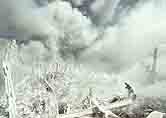
TUESDAY, Sept. 6 (HealthDay News) — Those who were directly exposed to the World Trade Center terrorist attacks on 9/11 appear to face an increased risk for developing long-lasting symptoms of acid reflux disease, New York City health researchers reported Tuesday.
The current analysis backs up previous indications that gastroesophageal reflux disease (GERD) symptoms are more likely to develop in those who also have asthma and/or post-traumatic stress disorder (PTSD). But GERD symptoms showed up independent of other health issues for people who were in the vicinity of the Twin Towers when they collapsed.
The findings are reported by a team led by Jiehui Li, from the New York City Department of Health and Mental Hygiene, and are published in the Sept. 6 online edition of the American Journal of Gastroenterology.
Prior research has already established that individuals directly exposed to the World Trade Center attacks have a higher-than-average incidence of GERD, asthma, and/or PTSD.
But the health team wanted to explore whether 9/11 gave rise to GERD independently. To do this, they looked back at data collected by the World Trade Center Health Registry, which was set up in 2002 to track the health status of those exposed to the attacks, including rescue and recovery workers, local residents, passers-by, and those employed and working in the vicinity of the towers.
Focusing on a pool of more than 37,000 adults, which amounted to a little more than half of the Registry’s database, the authors analyzed responses to two health questionnaires administered in 2003-2004 and 2006-2007.
None of the participants had ever reported having GERD symptoms before 9/11.
The surveys collected information on the type and duration of environmental exposure on 9/11 and the days after. Exposure included direct contact with the dust and debris from the buildings’ collapse.
Li’s team found that a little more than one-fifth of the Registry pool had symptoms of GERD when the first survey was conducted, and about two-thirds of those continued to struggle with symptoms by the time the second survey was administered.
Overall, the researchers found that the greatest incidence of GERD symptoms was cited among rescue and recovery workers who were present on 9/11; those who worked at the site for more than three months afterwards; and residents and vicinity workers who returned to homes, stores and offices that remained covered with dust.
The risk for developing such symptoms appeared to be equal across gender. However, Hispanics, poorer individuals, smokers and those with less than a high school diploma were more likely to report symptoms, while younger individuals (between 18 and 24) were less likely.
The researchers additionally confirmed prior indications that asthma and PTSD are in some way linked to GERD risk, and that having either or both significantly elevated GERD symptom risk.
While just under 14 percent of those who had neither asthma nor PTSD were found to have developed initial GERD symptoms, that figure rocketed up to nearly 46 percent among those with both, the investigators found.
The long-term persistence of GERD issues similarly went up with the presence of PTSD and asthma: 36 percent of those with both conditions were found to have lingering GERD symptoms five to six years following 9/11, while the same was true among 13 percent of those who just had asthma and nearly one-quarter of those who had PTSD.
However, even without asthma or PTSD, the risk for developing lasting GERD symptoms increased in direct correlation to the length of exposure to the dust cloud and other effects, the findings showed.
Li and colleagues suggested a number of reasons why 9/11 might have independently boosted GERD risk, including the environmental contaminants found in the dust cloud (such as alkaline materials). But, they said, “the biological mechanism is not clear.”
Dr. Ronnie Fass, chief of gastroenterology at the Southern Arizona VA Health Care System in Tucson, cautioned that “you have to be really careful how you interpret this data. Questionnaire retrospective studies like this have limitations.”
But, Fass added, “I will say that this is somewhat surprising, because it suggests that we’re not really sure what’s going on. This means that we have to go back to the drawing board and further investigate to find out what is the exact mechanism in these patients that gave rise to reflux.”
Dr. Perry J. Milman, an assistant clinical professor of medicine at Albert Einstein College of Medicine in New York City, agreed.
“This is interesting because the big question remains: why?” he said. “That is not answered here. It could be stress, which is a known trigger for GI [gastrointestinal] symptoms. And for those prone to develop GI symptoms when exposed to a major stressor, exposure to these particular events could have been the trigger. But that remains to be seen.”
More information
For more on the health impact of the 9/11 WTC attacks, visit the website of The City of New York.

